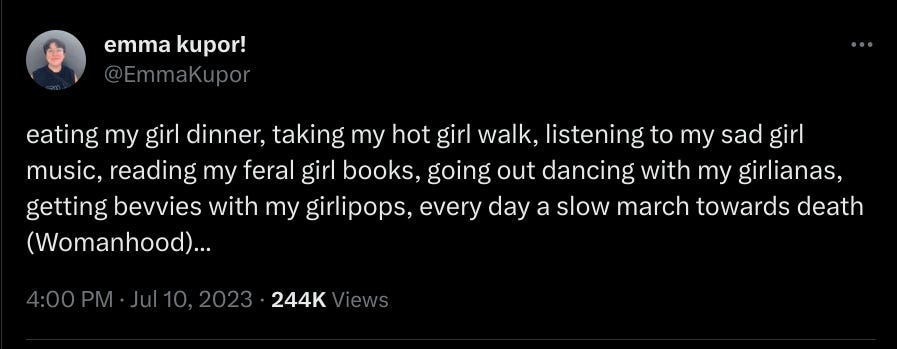An undifferentiated muck of ~content~
"Zoom wave," Fortnite addiction, Caroline Calloway, weather apps, NPC streamers, internet saturation and ChatGPT tips for journalists

Generative AI accelerated its creep into my profession last week — and I use the term “creep” deliberately — when Google shopped some mysterious robot-writing tool to executives at several major news companies. The product, they claimed, would help journalists … at least until competing AI applications replace them. Or until AI floods the internet with so much text that all information melts into a self-cannibalizing, undifferentiated muck where notions like “credibility” and “authority” and — I don’t know, “reality”?? — become quaint and irrelevant.
This, however, is far above my pay grade, as I unhelpfully told our AI-spooked interns at a lunch-and-learn last week. [Insert periodic reminder that in real life I work at a mid-sized local paper, and this newsletter is a quirky (quixotic?) hobby.]
I just write the words, okay?! And do the interviews. And the background reading. And the archival research. And in the months or years until ChatGPT replaces me, I’m going to keep playing while the ship goes down use it to make my job easier.
I’m not alone in that resolution, either: 74% of media workers have purportedly experimented with ChatGPT as part of their jobs. But I don’t see a ton of nuts-and-bolts discussion of what, exactly, these people are doing, and how ChatGPT has already touched the news you read (… even when it’s still written by human authors).
So! Here’s what I’ve personally found most useful, and how I’m using ChatGPT in my work. Fwiw, and as a massive introductory disclaimer, I do not/will not use ChatGPT to supply original information or analysis for stories or to write anything for publication.
1 // Organizing background material. Everyone has different methods/madnesses for initial research and pre-reporting, but my latest is this: Read everything I reasonably can about the subject; save relevant info as Raindrop annotations; export all those annotations to an unwieldy, many-paged Google Doc; and then outline and re-write through it. ChatGPT is helpful at the outlining stage. I recently asked it to reformat a bunch of background research as a timeline, which made it easier for me to read:
2 // Brainstorming interview questions. Once ChatGPT has some background on a story, it becomes useful for secondary reporting tasks, like brainstorming interview questions. I have also asked it for ideas of people to interview, with more mixed results — it once made up a politician. This was for a freelance story on wildfire smoke and worker protections:
3 // Checking blind spots. When I finish a draft of a story, I feed it to ChatGPT and ask what the story missed. I recently shared an example on Twitter involving this story about evictions. In the future, I plan to use a similar prompt to check stories for bias — a tip shared last month by Trusting News. And I’m v. curious to see what becomes of Source Scout, an AI tool designed to help journalists diversify their sources.
4 // Editing text. ChatGPT-produced writing is dreadful, on the whole, but I’ve had moderate success with this prompt: “Pretend you are a newspaper editor. I am going to send you the draft of an article to edit. Leave each sentence exactly as written, EXCEPT for sentences containing adverbs or passive verbs. In sentences containing adverbs, remove the adverb. In sentences containing passive verbs, rephrase the sentence to put the verb in the active voice. Do not make any other changes to phrasing, word choice or sentence structure.”
It’s not fail-proof, by a long shot (“fruitlessly”; the Yoda-speak in the last paragraph) but it’s generally worth the 30 seconds it takes to copy/paste a draft.
5 // Monitoring meetings. This takes a little more doing, because most meetings run long. But for public meetings where audio is available — via a personal recording or a YouTube or Facebook stream — I’ve started running that audio through Otter and then asking ChatGPT to summarize the transcript. (“I'm going to feed you a meeting transcript part by part. For each part, I want you to respond with a detailed summary of what was said. Each new summary should incorporate information from the previous summaries.”)
As always, I would love to hear your tips, tricks, prognostications for journalism’s future and offers of post-journalism jobs 🙃. You can reply to this email or reach me at linksiwouldgchatyou@substack.com.
If you read anything this weekend
“The ‘Scammer’ and the Scammed,” by Tyler Foggatt for The New Yorker. I made the mistake of checking how Caroline Calloway reacted to this piece, a dual review of her and Natalie Beach’s competing memoirs. Alas, she is ecstatic. She is vindicated! She is so eminently and entirely hateable that I could not possibly care if she’s the literary talent of my generation. And yet, I read this entire piece — and suspect many of you will, as well! — because Calloway “does understand the Internet” and “has managed to bend [it] to her will.”
“What If the Next Big Social Media App Is ... Nothing?” By Max Chafkin for Bloomberg Businessweek. Tech executives often describe their companies’ futures in triumphant, limitless terms — but there’s only so many people with so much time in this big ole screen-obsessed world. Chafkin argues we may have reached some “internet saturation point” already: Since the pandemic, time spent online has (mercifully??) fallen sharply.
“They Lost Their Kids to Fortnite,” by Luc Rinaldi for Maclean’s. Health authorities have long grappled with the concept of video game addiction, but evidence for the condition is adding up. In Canada, several groups of families sued Epic Games, the creator of Fortnite, after their children stopped sleeping, eating and using the bathroom to play longer.
“Wikipedia’s Moment of Truth,” by Jon Gertner for The New York Times Magazine. Generative AI could ~disrupt~ Wikipedia, much as it’s threatening to disrupt journalism — and with equally weighty results. That’s because Wikipedia basically underlays any other online tool that supplies facts or data, including Google, Alexa, Siri, Bing and ChatGPT itself.
“‘We Used to Check Every Day, Now It’s Every Minute’: How We Got Addicted to Weather Apps,” by Hannah Marriott for The Guardian. I do not personally identify with this premise — weather apps have been dead to me since Apple bought/ruined Dark Sky nigh on three years ago. But apparently our dual public health/climate crises kicked off weather app obsessions for lots of other people.
👉 ICYMI: The most-clicked link from last week’s newsletter was this remembrance of the Instant Pot (and other kitchen has-beens).
Thanks for being one of my 15,000 hypothetical Gchat friends.
Want to share your newsletter, podcast, job post or product with us? Click here to book a classified ad in the next edition.
Postscripts
Zoom wave. Husband meal. Perpetual stew summer. This month in promised comebacks: Neopets and Tumblr. This week in offbeat sleep aids: Pokemon and service terms. The economics of Bud Light. The science of the “Aged” filter.
How AI will — and won’t! — disrupt books. Why some people over (location) share. For more on my future under AI, consider the switchboard operator. Design resources from the Internet Archive. NPC streaming, explained. One last fun fact before you go: North America will run out of phone numbers in less than three decades.
That’s it for this week! Until the next one. Warmest virtual regards.
— Caitlin






